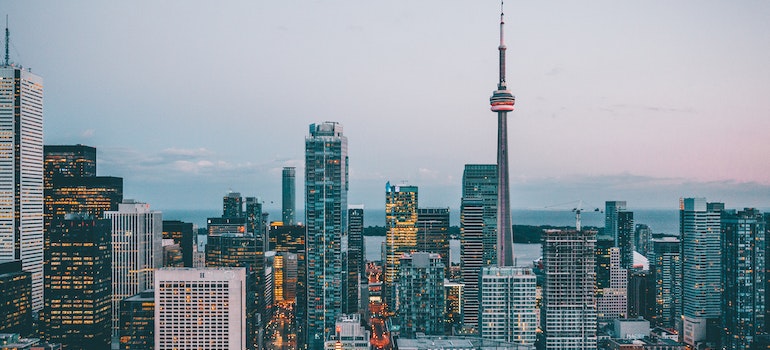Get Your Free Estimate Now
"*" indicates required fields
Welcome to your new journey in Toronto, Canada’s largest city and a dynamic metropolis filled with arts, culture, diverse cuisine, and warm locals. There’s a lot to love about this city, from its iconic skyline to its beautiful natural parks and lively neighborhoods. But moving to a new city can be both thrilling and challenging. Navigating the complexities of local customs, housing, transport, and lifestyle requires careful preparation and awareness. To help you make the most of your new life in Toronto and avoid common pitfalls, we’ve compiled a comprehensive guide about things to avoid after moving to Toronto with Professional Movers Canada. Whether you’ve just moved or are planning your relocation, these insider tips will help you adjust smoothly and enjoy the city to the fullest.
Overview of things to avoid after moving to Toronto
Relocating to a new city is a thrilling experience, offering a fresh start and new opportunities. However, it’s crucial to avoid some common mistakes to make your move to Toronto a smooth and enjoyable journey. Here’s a comprehensive list of things you should avoid:
- Overlooking the cost of living
- Neglecting public transportation
- Ignoring local customs and etiquette
- Underestimating the weather
- Not exploring neighborhoods before settling
- Overlooking healthcare plans
- Forgetting to update legal documents
- Disregarding community connections
- Not utilizing the city’s parks and recreational facilities
- Not preparing for Toronto’s job market

Each of these points highlights a potential pitfall to avoid when moving to Toronto. The good news is that we have some tips that can help you easily remember not to overlook these aspects and make the best of your move.
Overlooking the cost of living
Toronto’s high cost of living is primarily due to housing costs. So, before hiring condo movers Toronto, learn more about the costs. The average cost of a one-bedroom apartment in the city center can range from CAD 2,000 to 2,500 per month, whereas in the outskirts, it can range from CAD 1,500 to 2,000. Utilities can add around $150-$200 monthly, including electricity, heating, cooling, and water. Internet costs can be around $60-$100 per month.
When it comes to groceries, expect to spend approximately $300-$400 per person monthly. Dining out can cost around $15-$30 per person for an average meal in an inexpensive restaurant. Public transport is around $156 for a monthly pass on the TTC. If you plan to own a car, remember that insurance can cost upwards of $150 per month, and gas prices hover around $1.30 per liter. There are many costs to consider when relocating to Toronto, so proper budgeting is a must. Remember to account for all aspects of daily life to ensure a smooth transition.
Some tips to navigate the costs in Toronto
Navigating the costs in Toronto requires a combination of careful budgeting and savvy cost-cutting. Here are some brief tips:
- Create a budget: List your monthly income and expected expenses to understand your financial situation. Include housing, utilities, transportation, food, leisure activities, and an emergency fund.
- Cut costs where possible: Consider cheaper alternatives for various needs. For instance, opt for public transport over a personal vehicle, or buy groceries from discount stores like No Frills and FreshCo.
- Shared accommodation: If the cost of living alone is too high, consider shared accommodation to split rent and utility costs.
- Eating out vs cooking: Limit dining out as it can quickly add up. Instead, cook at home more frequently and try meal prepping to save both time and money.

Remember, the key to managing your finances after moving with Toronto movers is to spend wisely and save where you can. It might be challenging at first, but with careful planning, it becomes manageable.
Neglecting public transportation
Another common error newcomers to Toronto make is overlooking the city’s robust public transportation system. Many people, particularly those from car-dependent cultures, might be tempted to rely on personal vehicles. However, Toronto’s extensive transit system, comprised of subways, buses, and streetcars, serves the city well and can be a more cost-effective and efficient alternative. Driving in Toronto, especially during rush hour, can be stressful and time-consuming. Plus, parking can be scarce and expensive in the downtown area. If you decide to own a car, be aware of the costs associated with insurance, fuel, maintenance, and parking.
On the other hand, the Toronto Transit Commission (TTC) provides excellent service throughout the city and the Greater Toronto Area. Newcomers should familiarize themselves with the TTC’s routes and schedules and consider getting a PRESTO card for more convenience and cost savings.
Ignoring local customs and etiquette
While Canadians are known for their politeness and welcoming nature, it’s important to be aware of local customs and etiquette when moving to Toronto. For instance, tipping is a standard practice in Toronto for services such as dining out, getting a haircut, or taking a taxi. It’s also important to respect the diversity and multiculturalism that Toronto is renowned for. The city is a melting pot of cultures, and this is reflected in its neighborhoods, food, festivals, and more. Try to learn about different cultures, engage with locals, and participate in community events. Moreover, learning the local language nuances can go a long way. Although English is widely spoken, you’ll hear a variety of accents and slang that may be unfamiliar. Understanding and adopting these will help you fit in better and enhance your social experiences in Toronto.

Underestimating the weather
One of the things to avoid after moving to Toronto is definitely not getting familiar with the weather conditions. The city experiences a full range of seasons, from hot, humid summers to cold, snowy winters. Many newcomers, especially those coming from a completely different place and relocating with long distance movers in Toronto, are taken aback by the harsh winters and are ill-prepared for the snow, ice, and freezing temperatures.
Investing in appropriate winter gear is essential. This includes a warm coat, boots, hats, gloves, and even thermal layers. Remember, it’s better to over-prepare for the cold than to be caught off guard. Likewise, summers in Toronto can be hot and humid, so make sure you have appropriate summer clothing and stay hydrated. It’s also important to have proper home cooling systems to cope with the heat.
Not exploring neighborhoods before settling
Toronto, often referred to as a “city within a park,” is a mosaic of distinctive neighborhoods, each with its character and charm. So, one of the things to avoid after moving to Toronto is rushing into settling into the first available or cheapest housing you find. Spend some time understanding the ethos of different neighborhoods. Downtown Toronto, for instance, is ideal for young professionals seeking a fast-paced lifestyle with quick access to work, entertainment, and restaurants. Also, Downtown Toronto movers are always at your disposal. So, your relocation will be simple and stress-free.
Conversely, if you seek tranquillity, Leslieville or High Park, known for their family-friendly atmosphere and green spaces, may be more suitable. West Queen West, dubbed as an arts hub, could be a paradise for artists and creatives. Consider factors such as proximity to work or school, available amenities, noise levels, and safety. Check community bulletins, local blogs, and even Reddit threads to gain a grassroots perspective of potential neighborhoods. Investing time in this research ensures you’ll find a place that feels like home.

Overlooking healthcare plans
While Canada’s healthcare system is publicly funded, it doesn’t cover certain services like prescription drugs, dental care, or eye care, which can be expensive out-of-pocket costs. It’s essential to understand this and secure a suitable healthcare plan. Many employers provide health benefits packages, but for those who don’t have that option, private health insurance becomes critical. Explore various insurance providers, understand the coverage, and consider your medical needs while choosing a plan. Remember, the aim is to prevent hefty medical bills that can destabilize your finances. Make use of online comparison tools and consult insurance brokers if necessary.
Forgetting to update legal documents
Moving to a new city, especially as large as Toronto, involves a whirlwind of changes and adaptation. In this process, administrative tasks may seem less exciting but are equally critical. Updating your legal documents should be at the top of your to-do list.
Start by updating your driver’s license and vehicle registration, if applicable. In Ontario, you’re legally required to update your address within six days of a move. You can do this in person at a Service Ontario location or online through their website. Failing to do this could lead to fines or complications in the event of a traffic incident. Next, update your Ontario Health Insurance Plan (OHIP) card. The OHIP covers many health services, and having an updated card ensures you’ll receive the health care you need without any issues. Again, this can be done at a Service Ontario center.
If you own property, you’ll need to update your address for property taxes. This is typically done through the city’s revenue services department. Ensure all utility companies (hydro, water, gas, etc.) are informed of your move to avoid any service interruptions or billing issues. For non-Canadian residents, it’s crucial to keep immigration documents, work permits, or study permits up-to-date. These updates are managed by Immigration, Refugees, and Citizenship Canada (IRCC) and can usually be done online. Lastly, don’t forget to update your information with the Canada Revenue Agency (CRA) for tax purposes. This includes both federal and provincial taxes.

Disregarding community connections
Community connections can significantly influence your experience in Toronto. So, one of the things to avoid after moving to Toronto is neglecting the importance of them. The city thrives on its diversity and community spirit. Engaging with local communities helps you understand the city’s culture better, and it also provides an excellent way to network. Be it attending local events and farmers markets or joining community clubs and classes, there are plenty of opportunities for socializing. Neighbourhood Facebook groups can also be a good starting point. These connections often lead to friendships and provide a much-needed support system when you are settling into a new city. Remember, every connection you make is a step towards feeling more at home in Toronto.
Not utilizing the city’s parks and recreational facilities
Toronto offers a plethora of parks, beaches, and recreational facilities that add to the quality of life in the city. Whether it’s the sprawling High Park, the scenic Toronto Islands, or the stunning waterfront trails, these places provide a respite from the city’s hustle and bustle. Toronto’s Parks, Forestry, and Recreation division also offers various programs and classes at their community centers, often at a low cost. From swimming lessons to dance classes, there’s something for everyone. Incorporating these into your lifestyle after moving with residential movers Toronto not only contributes to your wellbeing but also provides opportunities to connect with fellow residents.
Not preparing for Toronto’s job market
Toronto’s job market is diverse and competitive, with prominent sectors including finance, technology, healthcare, and arts. To navigate this landscape, it’s vital to understand the job market trends and to network actively. Update your resume and cover letter to align with Canadian norms and standards. Online job platforms like LinkedIn, Indeed, and Workopolis are commonly used for job hunting, and attending local job fairs can provide valuable insights and contacts. Local employment agencies and newcomer services often provide workshops and one-on-one assistance with job searches, resume building, and interview preparation. Understanding and preparing for the job market increases your chances of landing a job that aligns with your career goals.

Being well-informed makes your journey simple
Being proactive and informed can drastically enhance your experience after moving to Toronto. While the city offers a plethora of opportunities, there are common pitfalls that newcomers might face. By understanding the things to avoid after moving to Toronto, you can seamlessly navigate your transition to this vibrant city. From budgeting effectively, exploring diverse neighborhoods, updating your legal documents, engaging with the community, and utilizing public facilities to preparing for the job market – careful planning and active involvement are your tickets to an enriching and comfortable life in Toronto. So, look for a reliable moving company, opt for a packing service Toronto, and get ready to enjoy your journey! When you know how to avoid these common mistakes, settling into your new place will be easy.
Contact Us
Get access to a variety of moving and storage Canada solutions:

Contact Our team
Call Professional Movers Canada or fill out our free moving quote form.

Get Your Quote & Plan
Receive an obligation-free estimate and a detailed plan of action for your move.

Enjoy a Professional Move
Leave all the vexing tasks of relocation to our skilled Canada movers.